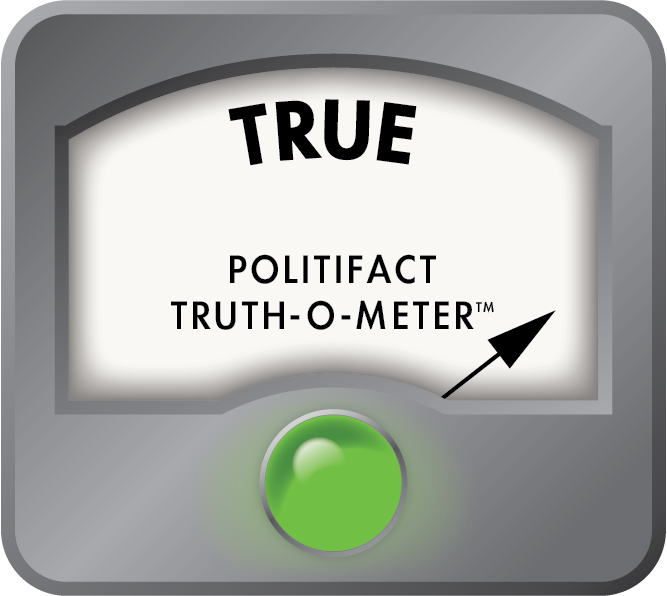Stand up for the facts!
Our only agenda is to publish the truth so you can be an informed participant in democracy.
We need your help.
I would like to contribute
Bernie Sanders says Amazon paid no federal income tax in 2017. He's right
The Forbes headline looked pretty good for Amazon chief Jeff Bezos: With the stock soaring, the world’s richest man accrued $9 billion in just two days.
U.S. Sen. Bernie Sanders, I-Vt., offered a different take on the company.
"You know what Amazon paid in federal income taxes last year?" Sanders tweeted. "Zero."
We’ve taken a look at a series of exaggerated claims about Amazon in the past. But in this case, Sanders is on the money.
Amazon’s 2017 tax return is not public, and a company spokesman did not return our request for comment. So to find the answer, experts told us to look at the company’s annual filings to the Securities and Exchange Commission. The company could face stiff penalties from the SEC for misleading reports.
In its annual report filed to the SEC in February 2018, Amazon estimated that not only would the company not be paying anything in 2017 federal income taxes, but it would be getting a $137 million tax refund.
So how did Amazon, which reported $5.6 billion in profit, expect to get money from the federal government in April?
Amazon lists two line items that likely got them here: tax credits worth $220 million and stock-based compensation worth $917 million.
These reflect the normal workings of the tax system, according to Annette Nellen, professor and director of the Master of Science in Taxation program at San Jose University.
"I would stress Amazon is just following the provisions that are in the law," Nellen said.
Companies aren’t required to spell out which tax credits they claim in their annual report, but Nellen said they likely include write-offs for research and development, domestic production, and equipment depreciation for Amazon.
Stock-based compensation, on the other hand, is spelled out a bit more clearly. Stocks are often handed out as a form of compensation to employees (usually executives) at small startups without much cash on hand. It’s also a common incentive for executives to make the company more profitable.
Featured Fact-check
Companies are taxed on their income, which is revenue minus costs. When stocks are offered as compensation, they are counted as a cost. This reduces the company’s taxable income.
The trick for companies? They get to write off the value at which the stock was later traded, not the original price for which they sold their stock to employees.
"Even if the grant was pennies on the dollar, the companies get to write off the full market value," said Matt Gardner, senior fellow at the Institute on Taxation and Economic Policy.
This year was the first time Amazon didn’t pay anything in federal income taxes. Gardner attributed that to executives cashing out on stocks they had been sitting on for a while.
A 1993 law capped untaxed executive compensation at $1 million — but the cap doesn’t apply to stock-based compensation. The new tax law signed by President Donald Trump subjects these stocks to the same rule, which will apply to Amazon’s 2018 taxes.
Overall, the new tax law largely works in Amazon’s favor, driving down the corporate tax rate from 35 to 21 percent. While that will only apply to Amazon’s 2018 income, its impact can be felt today.
Deferred taxes mostly apply to capital investments, or such things as equipment and new warehouses. Taxes on these items are deferred throughout the lifetime of the investment. So even if the tax rate was 35 percent at the time the investment was made, when the company actually pays these deferred taxes, the new 21 percent rate will apply.
This line item shrank Amazon’s estimated future taxes by $789 million.
Paying below the statutory tax rate isn’t new for Amazon.
From 2011 to 2016, Amazon reported a total $8.2 billion of pre-tax income and $944 million in federal income taxes, which amounts to a tax rate of 11.4 percent in the last five years, Gardner calculated.
Amazon, which launched online in 1995, long resisted charging a sales tax. But by 2012, it was collecting and paying sales taxes in multiple states. In 2017, it officially began paying taxes in every state where sales taxes exist, plus Washington, D.C.
Sanders said, "You know what Amazon paid in federal income taxes last year? Zero."
We can’t know that for certain until we see Amazon’s tax return. But experts say the closest estimate is that Amazon indeed paid zero in federal income taxes. In fact, Amazon estimates a $137 million rebate.
Experts said there was no indication of foul play. The tax credits and write-offs for stock-based compensation that enabled this were passed by Congress.
We rate this statement True.
Our Sources
Bernie Sanders, Tweet, May 1, 2018
Email interview with Josh Miller-Lewis, Bernie Sanders spokesman, May 1, 2018
Amazon, 10-K, Feb. 2, 2018
Phone interview with Matt Gardner, senior fellow at the Institute on Taxation and Economic Policy, May 1, 2018
Phone interview with Annette Nellen, professor and director of the Master of Science in Taxation Program, May 2, 2018
Email interview with Hughlene Burton, director of the Turner School of Accountancy and Associate Professor of Accounting at Belk College of Business, May 2, 2018
PolitiFact, Is Amazon a ‘no-tax monopoly,’ as Donald Trump said?, July 26, 2017
Browse the Truth-O-Meter
More by Manuela Tobias
Bernie Sanders says Amazon paid no federal income tax in 2017. He's right
Support independent fact-checking.
Become a member!
In a world of wild talk and fake news, help us stand up for the facts.










 PolitiFact Rating:
PolitiFact Rating: 





































